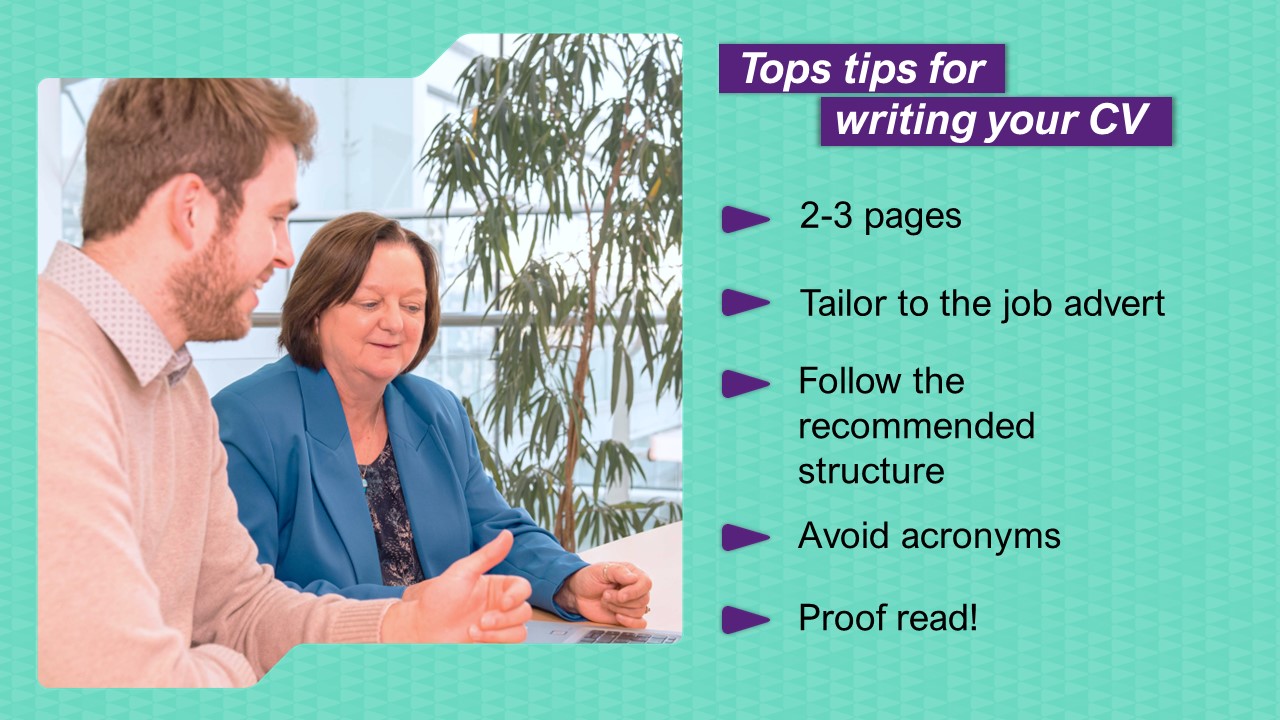You’ve found a role that’s perfect for you and you’re ready to begin your application. Follow our top tips below for the best chance of success!
As a Civil Service organisation, we operate a ‘fair and open’ recruitment process, based on meritocracy, and a high-quality CV is essential for showing us you’re the best person for the job.
Every job is different and therefore you should tailor your CV to the role you’re applying for, ensuring that it highlights your relevant (or transferable) skill-sets in line with the essential criteria listed in the job advert.
Remember to avoid using acronyms wherever possible to help make sure your skills and experience are understood.

When we review your CV, we’ll look for some key elements. We recommend following the structure below to help you effectively showcase your achievements:
Personal details
Include your name, address, telephone number(s), and email address.
Personal profile
This is a short introduction to you! It should say who you are and briefly outline your skills in relation to the job advert. Highlight your career aspirations and what you’re looking for, too.
Key achievements
Tell us about your achievements that you’re most proud of. An achievement should be something that’s quantifiable. Let us know the impact and outcome for the organisation and yourself.
Consider what you’ve accomplished: What situation you faced and what were the tasks? How did you approach it and what actions did you take? What was the result?
This is the opportunity to showcase your successes, how you exceeded targets or went above and beyond what is expected of you. What was challenging and significant? Between three and five examples are best practise.
Relevant experience
List your professional experience (starting with your present job and working back in time), highlighting to what extent they demonstrate your suitability for the advertised role. Include:
- Job title, employer’s name and dates of employment
- Your main activities and responsibilities within that role (where relevant to the advertised role)
- The main skills you used, which should be linked and relevant to the job advert
Applied skills and knowledge
Look through the job description and identify what specific skills and knowledge we’re looking for so you can match these to yours.
This is your opportunity to really promote skills and knowledge you have gained and applied. If you have unique skills that will help you stand out from other candidates, please include them.
We’d recommend to bullet point each skill, accompanied with a brief explanation about how you acquired this skill and any recent tasks or events where you have used it.
Education and qualifications
List your academic qualifications and any professional memberships (starting with the most recent), ensuring you have included any relevant to the advertised role.
In addition to the essential areas mentioned above, your CV may also include the following:
Additional capabilities
Do you have interests that carry responsibility in your personal life that highlights leadership, organisational and communications skills? Any activities or hobbies outside your scope of work? Perhaps you’re a volunteer, school governor, a scout or guide leader?
There are many activities you could list here but this is an opportunity to make a final positive impact on us.
Always remember that they need to show skills that could be transferable to the role.
Top tips for writing a good CV
- Include your personal details/contact information
- Keep it simple and concise. A good CV should be no longer than 2-3 pages of A4 with clear headings, so that the information is well laid out
- Understand the advert and tailor your CV accordingly
- Ensure it’s easy to pick out the key information using active language that is clear and direct
- Use assertive, positive language (action words) such as ‘developed’, ‘organised’ or ‘achieved’
- Write details in chronological order
- Most importantly, proofread your CV. It should not contain spelling mistakes, punctuation and grammatical errors. Spellcheckers can help with this. First impressions count so the CV should look professional.
- Share your CV with your friends, colleagues and family, as their feedback could help improve it.
Tips from our hiring team!

Molly, Talent Acquisition Manager
“The main points we look for are formatting, clear and easy-to-read information, that’s tailored to the post being applied for.
First of all, your CV will be reviewed against the Essential Criteria, so the ways in which you match these need to be clearly highlighted in your CV.
We then shortlist CVs during the sift process. Here, your CV will be scored against your Key Achievements, Relevant Experience, and Applied Skills and Knowledge. It’s important you emphasise your skills and make them easy to identify.”

“The main points we look for are formatting, clear and easy-to-read information, that’s tailored to the post being applied for.
First of all, your CV will be reviewed against the Essential Criteria, so the ways in which you match these need to be clearly highlighted in your CV.
We then shortlist CVs during the sift process. Here, your CV will be scored against your Key Achievements, Relevant Experience, and Applied Skills and Knowledge. It’s important you emphasise your skills and make them easy to identify.”
– Molly, Talent Acquisition Manager





